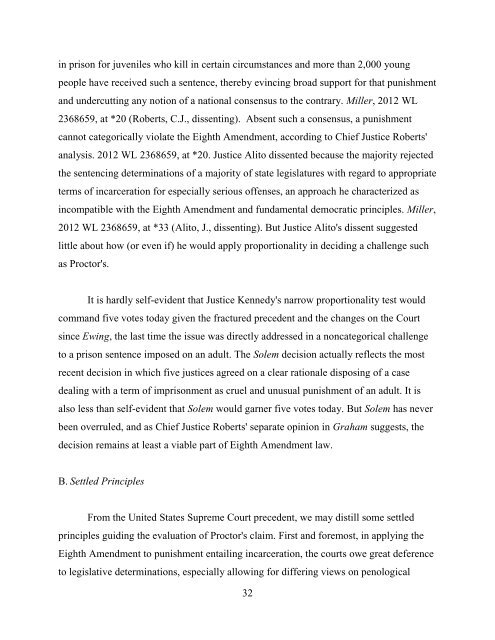State v. Proctor - Kansas Judicial Branch
State v. Proctor - Kansas Judicial Branch
State v. Proctor - Kansas Judicial Branch
Create successful ePaper yourself
Turn your PDF publications into a flip-book with our unique Google optimized e-Paper software.
in prison for juveniles who kill in certain circumstances and more than 2,000 young<br />
people have received such a sentence, thereby evincing broad support for that punishment<br />
and undercutting any notion of a national consensus to the contrary. Miller, 2012 WL<br />
2368659, at *20 (Roberts, C.J., dissenting). Absent such a consensus, a punishment<br />
cannot categorically violate the Eighth Amendment, according to Chief Justice Roberts'<br />
analysis. 2012 WL 2368659, at *20. Justice Alito dissented because the majority rejected<br />
the sentencing determinations of a majority of state legislatures with regard to appropriate<br />
terms of incarceration for especially serious offenses, an approach he characterized as<br />
incompatible with the Eighth Amendment and fundamental democratic principles. Miller,<br />
2012 WL 2368659, at *33 (Alito, J., dissenting). But Justice Alito's dissent suggested<br />
little about how (or even if) he would apply proportionality in deciding a challenge such<br />
as <strong>Proctor</strong>'s.<br />
It is hardly self-evident that Justice Kennedy's narrow proportionality test would<br />
command five votes today given the fractured precedent and the changes on the Court<br />
since Ewing, the last time the issue was directly addressed in a noncategorical challenge<br />
to a prison sentence imposed on an adult. The Solem decision actually reflects the most<br />
recent decision in which five justices agreed on a clear rationale disposing of a case<br />
dealing with a term of imprisonment as cruel and unusual punishment of an adult. It is<br />
also less than self-evident that Solem would garner five votes today. But Solem has never<br />
been overruled, and as Chief Justice Roberts' separate opinion in Graham suggests, the<br />
decision remains at least a viable part of Eighth Amendment law.<br />
B. Settled Principles<br />
From the United <strong>State</strong>s Supreme Court precedent, we may distill some settled<br />
principles guiding the evaluation of <strong>Proctor</strong>'s claim. First and foremost, in applying the<br />
Eighth Amendment to punishment entailing incarceration, the courts owe great deference<br />
to legislative determinations, especially allowing for differing views on penological<br />
32

















